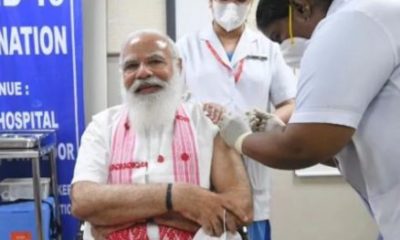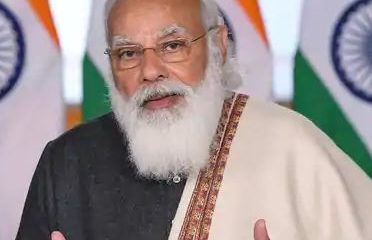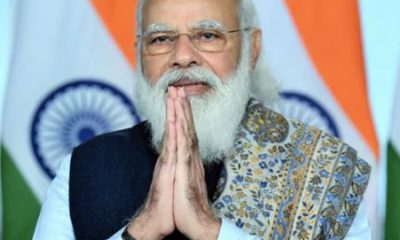Top News
Beyond borders: India, China must show climate stewardship

Hsüan-tsang, a scholarly Chinese monk in Vedic and Buddhism studies, crossed the formidable borders and travelled to India in search of original Buddhist scriptures. Hailing from central China’s Henan province, his well-known 7th century travelogue describes India as a ‘knowledge country’.
President Xi Jinping travelled to India in 2014 in search of political scriptures of newly-elected Prime Minister Narendra Modi. Never before had a Chinese president travelled to India so early in the new term of Indian prime minister. Xi will host Modi when he visits China next week, in the city of Xian, Xi’s home turf, reciprocating what Modi did in hosting Xi in Gujarat. Such homespun diplomacy between India and China, second and third largest economies of the world, have the potential to make a sea-difference in global politics provided both leaders look beyond the perennial visa-sensitivity and geographically thorny border diplomacy.
India and China are emerging giants. They are the only two countries in the world that have their GDP growing at more than seven percent amidst a global financial crisis.
The vexing challenges both countries face today are strikingly similar. The irreversible and pervasive degradation of their ecosystems is eroding the very foundation of their growth stories. Life-threatening air pollution, unmanageable waste generation, and insecurities relating to food, water and energy are the manifestation of the accelerated degradation of the ecosystems. Intertwined with these national concerns is the global issue of climate change that goes beyond the geographical borders.
As per the World Health Organization (WHO) 2012 Global Burden of Disease Study, in India, every year, nearly 1.5 to 2 million people die from indoor and outdoor air pollution. Figures in China could be similar or even more. As per WHO, New Delhi is the most polluted city in the world. Semi-permanent smog in most of China’s large cities has prompted Premier Li Keqiang to declare ‘war’ against the malaise. The recent documentary produced by a Chinese journalist, Chai Jing, on air pollution attracted 200 million views on social media and praise from China’s officials. But when the public debate started taking a noisy turn, the government banned the documentary, but not before learning a hard lesson that environmental degradation could lead to social unrest in a short time.
India, where gags and bans could trigger democratic chaos, is even more prone to such incidences that could destabilize its developmental plans. Worse, the air pollution due to transport, burning of agricultural residues and bio-mass for cooking and fossil fuel based industries, including open manufacture of bricks, causes dangerous brown clouds that could travel in the skies and affect the population of other Asian countries.
Joint India-China projects to deal with air pollution could be one of the major parts of the Xi-Modi summit. Indeed, the countries that have capability to master the skies by sending missions to Mars and the Moon certainly have collective capacities to deal with air pollution.
Both India and China have witnessed social unrest over the waste management issues. The recent mass protest in the city of Hangzhou, not far from Shanghai, over the location of a waste incineration facility and in Delhi, Pune, Mumbai on dumping of waste are wake-up calls for those who consider that infrastructure development means simply enhancing electricity distribution, building more of roads, rail, air ports and sea-ports. Xi, known for his conviction for more reforms and Modi, who is passionate about smart and clean cities, need to include environmental reforms to contain air pollution and deal with waste management.
Xi’s first visit to India took place in 2014, the hottest year in recorded history, as per NASA. Modi’s first summit with Xi in China is taking place in 2015, a year that would see a new climate deal in Paris. Last week, NASA reported that the monthly average global concentration of CO2 in the atmosphere has crossed 400 parts per million – for the first time in the last 800,000 years. Recognizing the urgency, Xi and Modi have committed themselves to ensuring success of the Paris meeting. They even went beyond the business-as-usual line and committed with US President Barack Obama to reduce the production and consumption of another far more (2,000 times more global warming than CO2) deadly green house gases (GHGs) – Hydro fluorocarbons (HFCs) – under the Montreal Protocol. Reducing HFCs, used extensively in room and car air-conditioning, and enhancing energy efficiency of air conditioning will bring early relief from the disastrous consequences of the climate change.
India and China have not yet officially submitted their INDCs (Intended Nationally Decided Contributions) to the United Nations climate secretariat, based on which the Paris agreement would have to be built. India has earlier declared its contribution through reduction in energy intensity whereas China recently declared the year in which it will peak its GHG emissions. Xi and Modi have the timely opportunity to demonstrate climate stewardship through effective and similar approaches for the GHG reductions. Such collaborative approaches would also directly help in reducing air pollution by reducing the use of fossil fuel. Effective waste management by reducing emissions of methane – another GHG – generated from waste dumps would also deliver social benefits.
Xi’s initiative of launching the Asian Infrastructure Investment Bank (AIIB), in line with the World Bank, has received overwhelming support from many developed and developing countries, including India. Modi, during his visit, can emphasize to China that investing in the climate-smart infrastructure should be the backbone of the AIIB. The investments made in low or zero carbon infrastructures through AIIB should be the modern Indian and Chinese scriptures of inclusive development.
Top News
Dr. Abhishek Verma Dedicates a Shelter in Memory of His Mother, Veena Verma, at KGMU; Inaugurated by Daughter Nicolle Verma

World-renowned business tycoon Dr. Abhishek Verma has supported Foodman Vishal Singh’s Hunger-Free World mission. In memory of his mother, Late Veena Verma, who was a 3 term Rajya Sabha MP.
Dr. Verma dedicated a state-of-the-art free permanent shelter for the attendants of patients at KGMU Medical University, Lucknow, under the aegis of Vijay Shree Foundation. His daughter, Nicolle Verma, inaugurated the shelter.

During the event, Foodman Vishal Singh honored Nicolle Verma by presenting her with a memento. Mrs. Nidhi Sharma and Avantika Yadav, associated with the organization, welcomed her with garlands. Following this, Nicolle Verma distributed essential items to the attendants and also handed out fruits. She became emotional remembering her grandmother on her birth anniversary.
On this occasion, she also inaugurated the “Veena Verma Sevalaya” in memory of her grandmother, Veena Verma, to serve the attendants. She expressed, “I feel proud that my family is engaged in nation-building as well as social service. Today, in collaboration with Vijay Shree Foundation founder Foodman Vishal Singh Ji, I feel immensely proud to dedicate this shelter for the poor, helpless, and needy attendants of patients battling serious illnesses like cancer. I am honored to be associated with the Hunger-Free World Mission for humanity.”

Inspired by the continuous humanitarian service provided by Vijay Shree Foundation over the past 17 years, Nicolle Verma donated 10 lakh rupees to support the cause. The purpose of this donation is to ensure that services continue for the needy attendants of patients suffering from severe illnesses in hospitals, as facilitated by Foodman Vishal Singh.
It is noteworthy that Dr. Abhishek Verma’s family has a legacy of public and philanthropic service. They are helping millions to carry forward the values and service work of their parents. On the occasion of his mother’s birth anniversary, Dr. Abhishek Verma dedicated this state-of-the-art permanent shelter at Lucknow Medical College to serve the attendants of patients through the Vijay Shree Foundation.

Supporting Foodman Vishal Singh’s Hunger-Free World mission, Dr. Abhishek Verma assured that he would continually support keeping this flame of humanity alive. He also promised to assist in providing medicines to the helpless patients.
Continuing her grandmother’s legacy of service, Nicolle Verma personally served food to the needy patients and attendants. She said, “It is our good fortune to have received the joy of doing this noble work today through Foodman Vishal Singh. I have taken another step forward in carrying my family’s values and cooperation by joining hands with the Vijay Shree Foundation. My father taught me to serve and help the needy, and I feel happy when I bring a smile to someone’s face.”

On the birth anniversary of the late Veena Verma, the event organizer, Vijay Shree Foundation founder Foodman Vishal Singh, said, “We feel proud and happy that Dr. Abhishek Verma, a globally renowned business tycoon, has extended his support to uplift our country from the hunger index. Today, on his mother’s birth anniversary, he inaugurated a state-of-the-art permanent shelter at Lucknow Medical College, which will always be helpful for the needy attendants of patients. It is a pleasure for me and the organization to receive the affection of Mr. Verma.”
The event was attended by General Manager Verma Family Office Hemant Garg, Sonu Rajput, and the organization’s volunteers, including Sandeep Singh, Parmeshwar Ji, Prashant Rao Gautam, Balram Singh, Ramesh Chaudhary, Suman, Jeetu, Anil, Suraj, Vinay, Manish Bhadauria, Manas Mehrotra, Vivek, Apurv, Happy, and others.





















